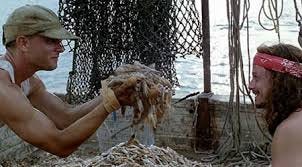What Does Forrest Gump's Shrimping Profit Teach Us About the Domestic Winners from Tariff Increases?
In the 1994 Blockbuster movie titled Forrest Gump, Mr. Gump becomes extremely rich as a shrimper when a natural disaster destroys all of his rivals’ boats. Tom Hanks stars as a lovable monopolist!
You can watch this scene where Forrest prays for shrimp.
As the major storm hits the Gulf, Forrest’s prayers are answered!
The net result is that our hero (Tom Hanks) is now rich!!
I thought of this scene as I read this article in today’s Wall Street Journal.
The WSJ article argues that shrimpers in Alabama will benefit from the tariffs as they will face less competition from imports from India, Ecuador , Indonesia and Vietnam.
In both the case of Forrest Gump and in the real world introduction of tariffs, shrimpers want to face less competition.
I am not calling the Alabama shrimpers “Forest Gump”. Instead, I am arguing that all businesses seek to face less competition. In the Movie, the natural disaster knocked out all of the rivals except for Mr. Gump. In the Trump Tariff case, the domestic shrimpers now have some “wiggle-room” as they face less competition.
When competition decreases, how much do the winners win?
How much will domestic prices for shrimp increase by? Will the average quality of shrimp increase because the product is fresher? Or has freezing technology improved enough such that domestic shrimp and imported shrimp are of equally good quality? How much extra profit will domestic shrimpers earn? Will small shrimpers (guys with 1 boat) gain as much as domestic Superstar shrimpers? Or are there significant economies of scale in this industry? Do shrimpers sell their shrimp at a competitive price or will local wholesalers earn monopsony profits as they offer the shrimpers a relatively low price for their shrimp?
If the Trump Tariffs stay in place, how many of the shrimpers in Alabama will enjoy a windfall in their incomes and how much $ will this be?
More generally, this case raises the issue of what is the geography of “winners” from the Trump Tariffs? What are geographic pockets of the nation whose economies specialize in industries that are in direct competition with foreign imports to the USA? I touched on some of these issues in my last substack that you can read here.





